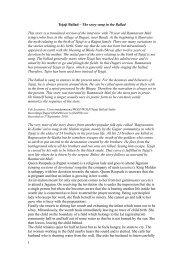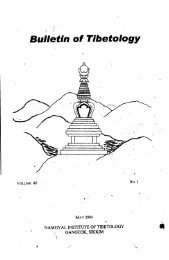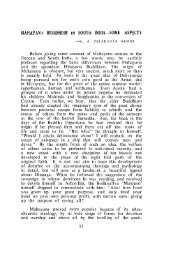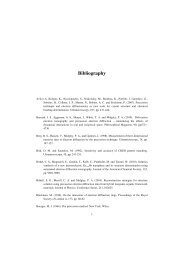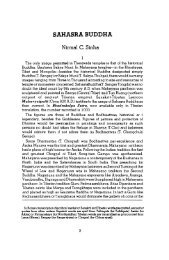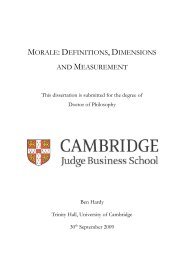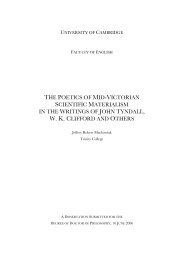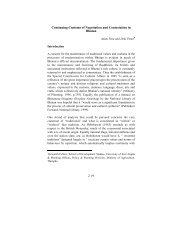The Crusades, the Genoese and the Latin East - DSpace at ...
The Crusades, the Genoese and the Latin East - DSpace at ...
The Crusades, the Genoese and the Latin East - DSpace at ...
You also want an ePaper? Increase the reach of your titles
YUMPU automatically turns print PDFs into web optimized ePapers that Google loves.
<strong>and</strong> <strong>the</strong> final agreement was signed infesto St Hilarii (13 January 1190). <strong>The</strong> kings agreed to be<br />
ready to sail toge<strong>the</strong>r on <strong>the</strong> day of St John <strong>the</strong> Baptist. 8<br />
This mission marked <strong>the</strong> beginning of <strong>the</strong> institutionalised response in Genoa to <strong>the</strong> fall<br />
of Jerusalem: when <strong>the</strong> entire commune took part in <strong>the</strong> prepar<strong>at</strong>ions for <strong>the</strong> crusade, as opposed<br />
to <strong>the</strong> sporadic acts of 1187-8. Ansaldo Bufferio <strong>and</strong> Enrico Deitesalve had a complic<strong>at</strong>ed<br />
diplom<strong>at</strong>ic mission, because <strong>the</strong> kings of Engl<strong>and</strong> <strong>and</strong> France had many o<strong>the</strong>r problems to<br />
encounter before <strong>the</strong>y could commit to certain d<strong>at</strong>es or tasks. Consequently, <strong>the</strong> arrangements for<br />
this important wave of <strong>the</strong> Third Crusade took much longer than expected; it took <strong>the</strong> kings of<br />
Engl<strong>and</strong> <strong>and</strong> France nearly three years from <strong>the</strong> fall of Jerusalem<br />
to finally embark on <strong>the</strong> crusade<br />
<strong>and</strong> <strong>the</strong>n a fur<strong>the</strong>r year, which <strong>the</strong>y spent en route, wintering in Messina, Sicily. In Genoa too, <strong>the</strong><br />
logistics of a crusade were complic<strong>at</strong>ed. Importantly, <strong>the</strong> arrangements involved large scale<br />
investment by many in Genoa, long before <strong>the</strong> first troops of crusaders stepped into <strong>the</strong> city's<br />
harbour. Still, <strong>the</strong>se funding problems were only part of <strong>the</strong> picture when considering <strong>the</strong> full<br />
meaning of organising an intern<strong>at</strong>ional, simultaneous crusade.<br />
<strong>The</strong> next stage of <strong>the</strong> crusade, from Genoa's point of view, was <strong>the</strong> embark<strong>at</strong>ion of <strong>the</strong><br />
main <strong>Genoese</strong> contingent in <strong>the</strong> autumn of 1189. Why did <strong>the</strong> <strong>Genoese</strong> not wait to embark with<br />
<strong>the</strong> English <strong>and</strong> <strong>the</strong> French? <strong>The</strong> contemporary sources do not provide a direct answer to this<br />
question, but many reasons come to mind. <strong>The</strong> first reason was obviously <strong>the</strong> urgent need in <strong>the</strong><br />
<strong>L<strong>at</strong>in</strong> <strong>East</strong> to stop <strong>the</strong> progress of <strong>the</strong> enemy. <strong>The</strong> <strong>Genoese</strong> history of <strong>the</strong> kingdom of Jerusalem<br />
employs powerful words when it explains wh<strong>at</strong> motiv<strong>at</strong>ed <strong>the</strong> <strong>Genoese</strong> reaction: `pro Deo et<br />
intuitu piet<strong>at</strong>is terram non permitterent subiugari a Sarracenis.... '29 This sentence reflects<br />
peoples' feeling not only in 1187, when it was written, but surely l<strong>at</strong>er on too, when more details<br />
had reached <strong>the</strong> west <strong>and</strong> <strong>the</strong> full meaning of <strong>the</strong> fall of <strong>the</strong> crusader st<strong>at</strong>es was comprehended.<br />
Perhaps <strong>the</strong> rewards in <strong>the</strong> form of more privileges <strong>and</strong> concessions, to individuals <strong>and</strong> to <strong>the</strong><br />
commune, had encouraged <strong>the</strong> <strong>Genoese</strong> to embark early. <strong>The</strong> de<strong>at</strong>h of William 11 of Sicily, who<br />
was <strong>the</strong> first ruler to send troops on <strong>the</strong> crusade, <strong>Genoese</strong> warriors among <strong>the</strong>m, might<br />
have been<br />
ano<strong>the</strong>r reason for <strong>the</strong> urgency. Finally, it is possible th<strong>at</strong> this early embark<strong>at</strong>ion was part of <strong>the</strong><br />
agreed plan with France: th<strong>at</strong> Genoa would embark separ<strong>at</strong>ely <strong>and</strong> not toge<strong>the</strong>r, which would<br />
have required more ships. For one reason or ano<strong>the</strong>r <strong>the</strong> <strong>Genoese</strong> embarked approxim<strong>at</strong>ely nine<br />
months before <strong>the</strong> French <strong>and</strong> English troops were suppose to meet in Sicily <strong>and</strong> sail on to <strong>the</strong><br />
<strong>L<strong>at</strong>in</strong> <strong>East</strong>. Because of <strong>the</strong> eventual delay in <strong>the</strong> embark<strong>at</strong>ion from Sicily, <strong>the</strong> result was th<strong>at</strong> <strong>the</strong><br />
<strong>Genoese</strong> had spent two years in <strong>the</strong> <strong>L<strong>at</strong>in</strong> <strong>East</strong> before <strong>the</strong> English <strong>and</strong> French troops stepped<br />
ashore.<br />
28 Roger of Howden, Gesta Regis Ricardi, ibid, p. 105<br />
29 Regni Iherosolymitani brevis historia, in Ann. Ian., vol. 1, p. 143<br />
23



